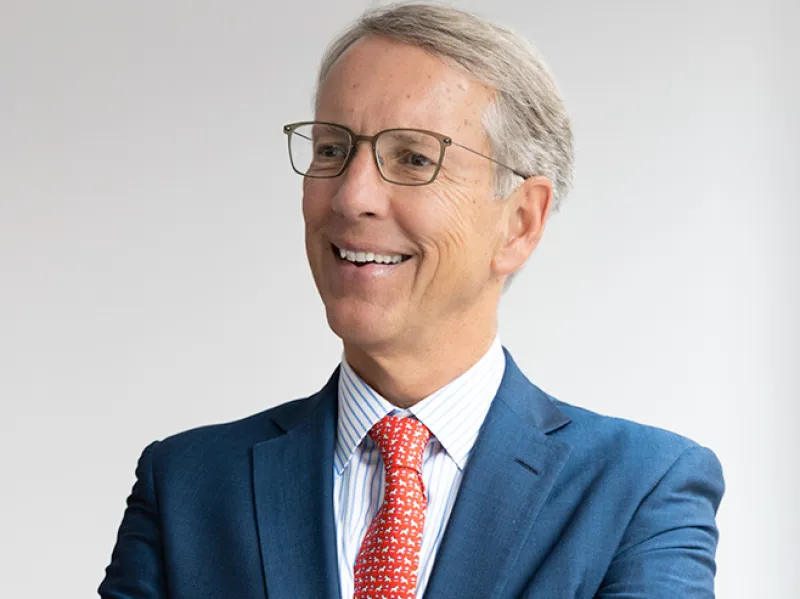
When Scott Bok left his home in Grand Rapids, Michigan, to attend the University of Pennsylvania in 1977, he had no plans for a career on Wall Street. Few of his generation did, and for good reason: Interest rates were 20 percent and the Dow was at 1000. Bok did not know what an investment banker was, hedge funds barely existed, and the terms “private equity” and “shareholder activist” had not yet been coined.
But by 1986, as Bok pondered which Wall Street firm to join, the stock market was already beginning to take off — the start of a now-50 year run that would change the world. It would also create sums of wealth few could have imagined, and the power that goes along with that, which Bok now believes has had some negative consequences. He points to the troubles facing Ivy League universities, their endowments, and even private equity — in addition to democracy itself.
The next half century was a tumultuous one on Wall Street, as Bok details in his recent book “Surviving Wall Street: A Tale of Triumph, Tragedy and Timing.” As he recounts, various events tested the market’s resilience — from the near collapse of Long-Term Capital Management and the dot-com crash to the financial crisis of 2008 to Covid-19 and its inflationary aftermath. Hedge funds were liquidated, Lehman went bankrupt, and many small prestigious firms fell by the wayside. A few elite firms, like Morgan Stanley, where Bok got his start, survived by morphing into giant trading behemoths, then retail powerhouses, and finally, during the 2008 financial crisis, banks regulated by the Federal Reserve.
Bok — the “survivor” of the book’s title — managed to sidestep much of the drama by leaving Morgan Stanley to join Robert Greenhill, who had previously started Morgan Stanley’s M&A advisory business and later launched his own small advisory firm Greenhill & Co. It became one of the most successful boutiques by sticking to its knitting, which included helping corporations fend off corporate takeovers, facilitating mergers, and other financings. After 27 years at Greenhill and 16 years as its CEO, Bok by early 2023 had decided it was time to sell the firm. Contemplating a quieter life ahead, he was finishing up a memoir of his Wall Street career.
Then the donors of the University of Pennsylvania revolted — thrusting Bok into the public spotlight in a way he’d never experienced before.
As the president of the university’s board of trustees, Bok found himself dealing with the same tactics he had faced defending the corporate world. But this time, as he put it in his book, “the stakes were higher.” The targets were ostensibly Penn President Elizabeth Magill and Bok, her defender, but as Bok tells it, they also included “free speech, academic freedom, antisemitism, DEI, ‘woke-ism,’ and the role of wealthy Wall Street patrons in the governance of nonprofit institutions.”
He was going up against the same financiers who’d attended Penn’s Wharton School of Business, a breeding ground for members of the Wall Street elite including himself, and who now were some of Penn’s wealthiest donors. Though hundreds of them got involved — at least in letters or emails to Bok — the person leading the fight in public was Marc Rowan, the CEO of Apollo Global Management, one of the most powerful private equity firms. A spokesman for Rowan declined to comment.
The fracas at Penn, which erupted around the Oct. 7 Hamas attack on Israel and student protests against Israel’s subsequent attack on Gaza, eventually led Magill and Bok to resign. Soon other university presidents at Ivy League schools quit under pressure. And now the Trump administration, backed by some of those same Ivy League donors, is embarked on its own hostile tactics against the universities that threaten to roil the schools, including their endowments. As a result, even the private equity market is feeling the heat.
Institutional Investor recently interviewed Bok for his take on all these happenings. What follows is an edited, condensed version of our conversation that touched on everything from the influence of donors to the future of both university endowments and private equity, along with his views on the power of Wall Street.
In your book, you write that the battle at Penn mirrored what you’d experienced in the corporate world and that “the same bare-knuckled tactics were utilized.” Can you describe that?
The type of corporate transaction that this whole effort seemed the most comparable to was when you have activist shareholders try to get control of a board of directors. So what are the parallels? The initiative at Penn was to try to get control of the board. There were many of the same people — M&A bankers, private equity bankers, hedge fund people — involved on both sides. The tactics in a struggle for corporate control in the public markets have a multifaceted approach. One is a lot of public relations, a lot of media effort to build up support for the view that the company’s poorly run or that the CEO needs to be fired or that the business strategy needs to change. PR is a very substantial part of an activist shareholder’s toolkit, and clearly that happened here. They also try to bring to bear things like government involvement.
I don’t even know with certainty who was behind all these different initiatives. There were daily letters written to the entire board of directors. There were very active social media campaigns so when something would happen, whether it was a protest on campus or that congressional testimony [New York Rep. Elise Stefanik’s infamous grilling of Magill and other university presidents], you would find snippets of that being posted on Instagram or Twitter ricocheting around the world at great volume. It was very sophisticated.
Your opponents were Penn’s donors. What did they want?
There was a group of donors who wanted to use this moment to fundamentally change the culture at Penn. I don’t think today donors are much of the issue now. It really has shifted to the government. But whether it’s the government or donors, they would love to see schools become even more career focused, maybe run by business people or politicians instead of academics. The much, much bigger threat is the federal government because the government money dwarfs the donations.
How will this affect university endowments?
If David Swensen, the famous grandfather of endowment investing from Yale, were still alive, I am confident he would say that right now is the most difficult and uncertain time for endowments in his entire career. First of all, they don’t know what the financial needs of the school are going to be. They thought it was like clockwork — 5 percent a year, and we’re going to budget that, and we’re going to have liquidity to pay that out, and we have nothing else to worry about.
The reason you see schools doing significant borrowing and exploring sales of illiquid private equity interests now is they’re thinking, “Wait, the school might need a lot more money from us than it has historically, so we need to invest a bit differently and be a little more liquid.” They’ve got to be very concerned with a significant endowment tax because now you have to factor into your investments and your liquidity the ability to pay out hundreds of millions of dollars a year potentially in endowment taxes. You’ve got to worry about whether the school is going to want to dip into the endowment to cover research funding that’s been taken away, as Harvard has hinted it will do.
Endowment managers are probably just doing a lot of contingency planning and trying to be more liquid than they have been.
That speaks to what’s going on in private equity right now. In your book, you call private equity chiefs today’s “masters of the universe.” But you also talk about the Darwinian struggle for survival on Wall Street, with different firms and different powers having dominance in different eras. What do you think is the future of private equity?
It’s very likely that there’s going to be some significant consolidation. The sheer scale of the enterprises they own means there aren’t enough exits for all of them.
When you get to a certain size, the bigger the sector gets, the more it needs deals to feed that machine. And if it doesn’t get enough deals, that machine has to shrink because it has become too big for the amount of transaction activity that’s out there. To satisfy the needs of all these major private equity firms, you need trillions of dollars of transactions a year. If transaction activity just slows down to the point where a large number of private equity funds can no longer operate in a meaningfully profitable way, you’re going to have significant retrenchment.
It has been a very difficult fundraising market for those funds for a long time. Their biggest fans were the major university endowments. If you have those institutions suddenly going through financially challenging times, and you have places like Harvard and Yale selling billions of dollars in private equity, that’s a big impact. It has to make institutional investors ask of all kinds of questions, like, “How much of my money do I want to have in private vehicles where if I ever do need to sell, I’m going to probably have to take a significant discount?”
Looking back, what’s your overall view of Wall Street?
I think coming out of a period of real economic stagnation, a robust financial sector, including private equity funds and aggressive investment banks, added a jolt of energy and boosted productivity and helped grow our economy and grow wealth. I think that’s all good. I think it’s debatable right now whether the financial sector at this moment is kind of too big or too powerful. A lot of people would argue that money has too much of an influence in our political life.
Would you?
I think I would. When you get to the scale we’re at now of political contributions and so on, it’s a bit of an arms race and hard to imagine that it’s really healthy for a democracy.
When did you start to think there’s just too much money on Wall Street, that things have gone too far?
I would say not until the very, very end of my career as a leader. The rise of Wall Street has substantially increased the disparity of wealth in this country. This leads to political anxiety.





